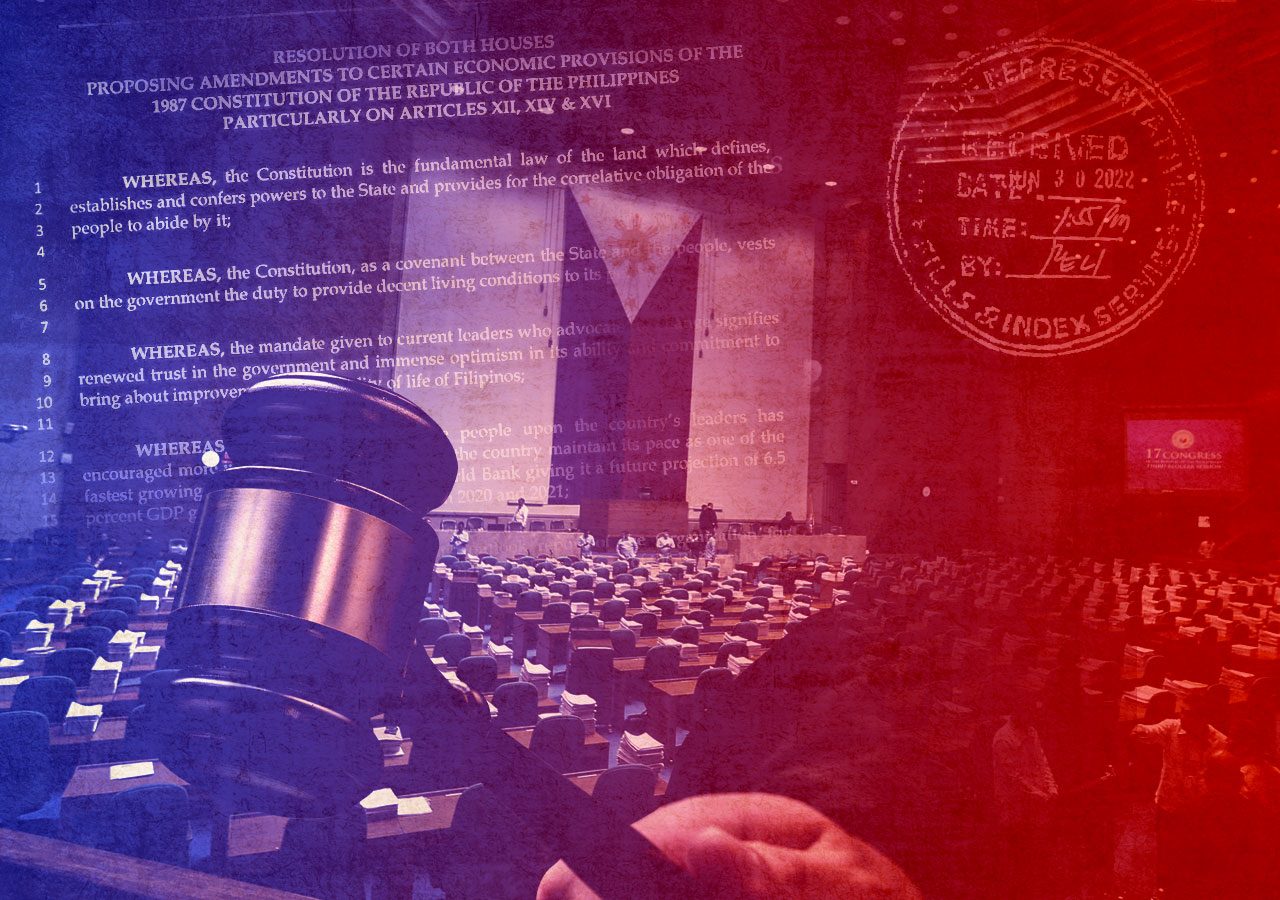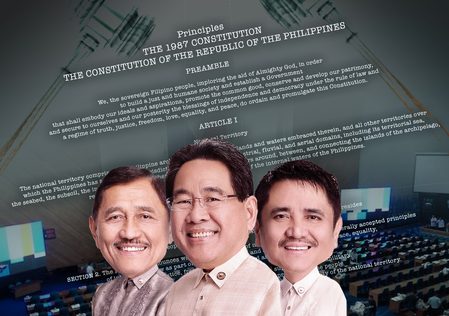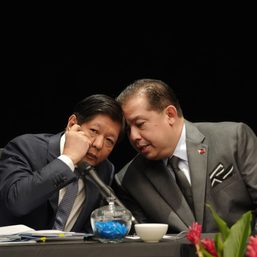SUMMARY
This is AI generated summarization, which may have errors. For context, always refer to the full article.

MANILA, Philippines – As Filipinos reel from rising prices of some basic goods and services, lawmakers turn to charter change discussions in a supposed bid to accelerate the country’s economic growth.
The House of Representatives in the 19th Congress started tackling proposals to amend or replace the 1987 Constitution in December 2022, and is set to resume meetings beginning Thursday, January 26. The lower chamber’s miniscule minority has vehemently expressed apprehensions over the move.
Two analysts whom Rappler spoke to in separate interviews are not necessarily opposed to the idea of bending the cap on foreign ownership in certain sectors, but are cautious either about the timing of the push or prioritizing charter change conversations.
“We are in a situation where Filipinos cannot run our economy alone. We can’t insist on limiting foreign investment. It doesn’t make sense anymore,” said Michael Yusingco, a senior research fellow at the Ateneo School of Government. “But I don’t agree with [the concept of] prioritizing because our problems are complex, multi-layered.”
“To me, it’s off that we have thought of charter change amid the many problems our economy has,” added Agustin Arcenas, associate professor from the University of the Philippines Los Baños’ College of Public Affairs and Development.
They also emphasized that charter change is not the only answer to the country’s current economic headaches.
“We should erase the narrative that changing the Constitution will immediately make our lives easier. It’s not automatic, it doesn’t work that way,” Yusingco said.
“I think it should be the last thing in their minds because our economic problems are immediate and they require attention,” Arcenas added.
What’s inside the bills
Out of nine bills referred to the House constitutional amendments panel, two are pushing for economic amendments, namely, measures filed by House energy panel chairman Lord Allan Velasco (Marinduque), and legislative franchises committee chairman Gus Tambunting (Parañaque 2nd District).
Tambunting wrote that the goal is to “accelerate economic growth and fulfill the Philippines’ international commitment.”
The two propose to amend provisions in Articles XII, XIV, and XVI of the existing charter, saying that restrictions hamper the country from receiving more foreign investments, unlike Southeast Asian neighbors with more liberal ownership rules.
The 2022 World Competitiveness Ranking of the International Institute for Management Development, for instance, ranks the Philippines 48th out of 63 countries, partly citing the country’s restrictive investment environment as a factor in its low ranking.
Foreign citizens, for example, are constitutionally prohibited from taking more than a 40% share of capital in co-production, joint venture, or production-sharing agreement in matters involving natural resources.
In a proposed amendment, the phrase “unless provided by law” will be added to give lawmakers the option to pass a measure that would provide a wider leeway for foreign investors to operate.
Tambunting argued that removing restrictive economic provisions will allow foreign businesses to “breeze into a more conducive investment landscape.”
Alongside exploration, development, and utilization of natural resources, foreign investors will be allowed broader control in public utilities, lands of the public domain, grants of congressional franchises, educational institutions, advertising, and mass media.
Pros and cons
For Yusingco, easing economic restrictions is necessary to “open up the market.”
“It doesn’t make sense that our Constitution restricts these industries, but at the same time, our state, our government cannot actually effectively run these sectors,” Yusingco said.
When the framers of the 1987 Constitution created the charter, they aspired for a more nationalized setup for the country’s industries through the 60-40 rule.
Yusingco said the expectation at that time was that wealthy Filipinos would invest their money in the Philippine economy.
He believes that if foreign investors are permitted to have a bigger slice of the pie, competition across industries will increase.
For Arcenas, there are some industries where putting Filipinos in the driver’s seat is “non-negotiable.”
“I don’t think that foreign dominance should be encouraged or allowed, particularly in the media,” he said. “On the issue of natural resources, it depends because if it’s a natural resource that will protect our food security, I think it must remain in the hands of Filipinos.”
“But for other sectors like telecommunications, why not, so that we could improve our internet and phone services,” he added.
Arcenas also warned that foreign competition might pose a threat to local businesses.
“It’s not a win-win situation with all its negative impacts. There’s a winner and there’s a loser. The question is: what do you do with the loser, how do you help the loser?” he asked.
Feared consequences
Kabataan Representative Raoul Manuel of the left-wing, three-member Makabayan bloc is adamant against easing economic restrictions due to fears that it would favor only foreigners and individuals with political and economic powers.
“This will not serve the interest of the Filipino people, who are now struggling with high prices of basic goods, inaccessible social services, and other problems,” Manuel told Rappler in a separate interview.
He said that instead of relying on the possible outcomes of amending the Constitution, the attention should shift to genuine agrarian reform and national industrialization.
“We need to have factories for basic commodities, where they can provide jobs for our citizens. With that, we no longer need to expose our economy to big foreign corporations that will only deplete much-need resources that Filipinos should benefit from,” Manuel asserted.
Manuel added that a 100% foreign ownership will erode the capacity of the country to stand on its own feet on matters such as food and energy sources.
But Yusingco hopes that should the economic charter change gain traction, safety nets would be in place.
“We open the economy in our Constitution, but still we retain the discretion of who we allow to come in, right? So, we can’t just open and let anyone in, it doesn’t work that way,” he said.
Latest bid
Attempts to amend the Constitution have been made since the Fidel V. Ramos administration, but none have succeeded amid fears that any push would eventually result in politicians’ longer stay in office.

“When the word charter change is said, the immediate thought of people is that [politicians] just want to extend their terms,” Yusingco said.
The administrations of Joseph Estrada and Benigno Aquino III saw proposals to introduce economic amendments in the charter, specifically on opening up more sectors to foreign investors.
The Marcos administration is in a familiar but also unfamiliar situation: charter change discussions are not new, but the economic circumstances of today are arguably more challenging than before.
Regardless of constitutional amendments, Yusingo believes that the solution to the current economic crisis lies in Marcos’ quality of governance.
“If the current administration does not improve, in terms of their governance, then what confidence will our economy improve? No, we have no confidence. It will only get worse,” he said.
For Manuel, Filipinos should remain vigilant, as he offers the reminder that the 1987 Constitution was crafted in the aftermath of the people’s resistance to the dictatorship of Ferdinand E. Marcos.
“If those [economic provisions] are removed, the people will not be the winners. The wealth and power in the country will only be concentrated to a select few,” he said. – Dexter Barro II/Rappler.com
* All quotes in Filipino were translated into English, and some were shortened for brevity.
Add a comment
How does this make you feel?






There are no comments yet. Add your comment to start the conversation.